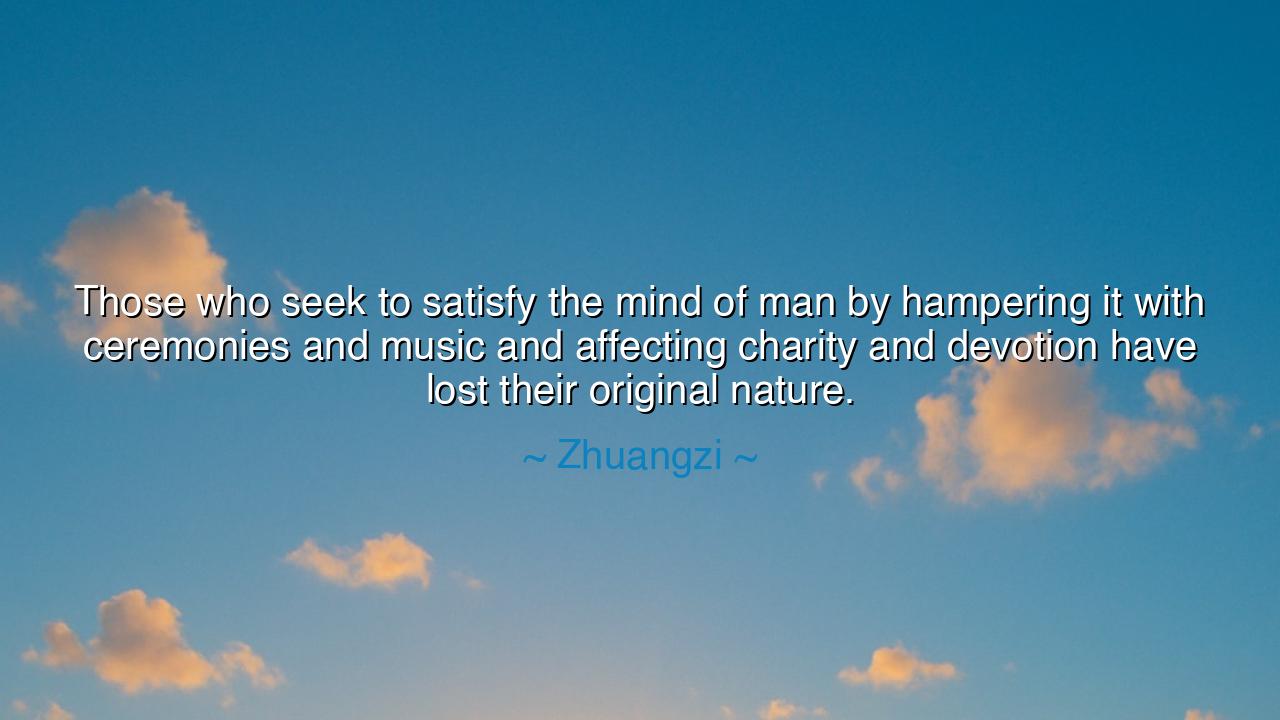
Those who seek to satisfy the mind of man by hampering it with
Those who seek to satisfy the mind of man by hampering it with ceremonies and music and affecting charity and devotion have lost their original nature.






Hear the voice of Zhuangzi, the sage of wandering and the master of paradox, who declared: “Those who seek to satisfy the mind of man by hampering it with ceremonies and music and affecting charity and devotion have lost their original nature.” In these words, he strikes at the heart of false appearances and warns against the gilded cages men build for themselves. He tells us that when the spirit is bound by hollow rituals, by empty gestures of goodness, by music that is performance rather than truth, the soul strays from its original nature—the pure, uncarved simplicity with which it was born.
When Zhuangzi speaks of ceremonies and music, he does not condemn true music nor the rites that spring from the heart. He condemns those who use them as masks, as tools to impress or control, rather than as expressions of natural being. Music born from authenticity uplifts, but music used to restrain becomes a chain. Ceremony that honors truth is noble, but ceremony performed only to appear virtuous is hypocrisy. Thus, Zhuangzi warns us against the counterfeit: forms that hide emptiness, gestures that smother the living spirit.
He names also charity and devotion, not in their pure forms, but in their pretenses. To “affect” charity is to pretend compassion without true kindness; to “affect” devotion is to wear piety as a robe while the heart is barren. Such people may deceive the world for a time, but in seeking to “satisfy the mind of man,” they have turned from the root of life. They live for appearances, for the approval of others, and in doing so they betray the self.
History is full of this pattern. Consider the final days of the Roman Empire, when rulers held vast public games and ceremonies to distract the masses. Bread and circuses, music and spectacle, were offered not from love of the people, but to satisfy their restless minds while corruption rotted the core of the state. The empire glittered with ritual, but its original nature—the discipline and simplicity that built Rome—was lost. Soon after, the empire fell.
Yet we also see the opposite: those who preserved their original nature by rejecting hollow forms. In the forests of India, the Buddha left behind the ceremonies of his princely life, seeing them as gilded illusions. He sought instead the quiet truth of meditation, stripping away false devotion until he touched reality itself. By abandoning appearances, he found enlightenment. Thus, Zhuangzi’s wisdom finds echo in other traditions: authenticity is the root of the Way, while false appearances lead only to emptiness.
O children of tomorrow, learn from this: do not confuse the mask with the face, nor the echo with the song. Do not think that by multiplying rituals you will find peace, nor that by pretending devotion you will gain virtue. Seek instead to return to your original nature—to simplicity, honesty, and the living pulse of the heart. Let your music rise not from duty but from joy; let your charity flow not from obligation but from compassion.
Let your practice be thus: strip away the unnecessary. Do not live for the approval of others, for this is to “satisfy the mind of man” while starving your own soul. Instead, live in accordance with truth. Speak when words are needed, act when kindness is real, create when the spirit stirs. In this way, you will remain close to your nature, and your life will ring with authenticity rather than echo with emptiness.
So remember the words of Zhuangzi: to cling to hollow ceremonies, false music, and affected devotion is to lose the original nature. To live authentically, free of pretense, is to walk the Way. Choose the Way of truth, and though your life may appear simple, it will be vast, as vast as the sky under which all true music flows.






AAdministratorAdministrator
Welcome, honored guests. Please leave a comment, we will respond soon